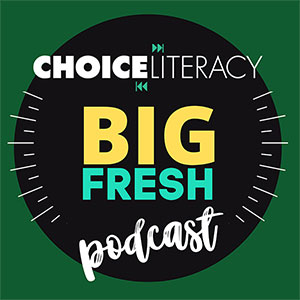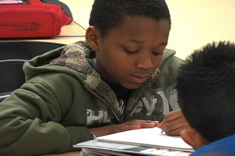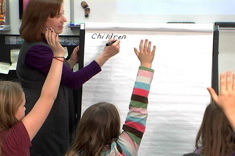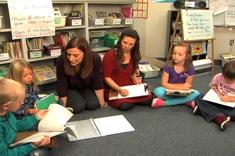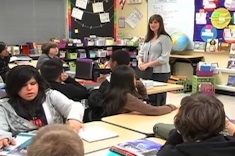In this podcast, Ruth Ayres chats with Franki Sibberson about why it’s so important for teachers to write, and how she finds time in her packed schedule for writing books and blogging. Ruth is the coauthor (with Stacey Shubitz) of Day by Day: Refining Writing Workshop Through 180 Days of Reflective Practice. Ruth and Stacey blog together at Two Writing Teachers. Ruth also blogs solo at Ruth Ayres Writes.
A full transcript is available below the player.

Franki Sibberson: Ruth, you believe strongly in the idea of teacher as writer. Why do you think it’s so important for teachers to write?
Ruth Ayres: Well, I think it gives us an insider’s understanding of what it means to write. Writing is one of those things that it looks really easy from the outside but then once you do it for yourself you realize that it’s not so easy.
So, because I write I know what it’s like to not have anything to write about or to want to write. I know what it’s like to feel like I’m not good enough at writing something and like I know how to draft through tough spots and those kinds of conversations when I’m conferring with kids or leading a mini lesson make a really big difference in the kind of writing that kids are able to do.
I also have noticed that as I’m working in my role as a coach, I’m working with teachers, the teachers who are writing themselves, they just seem to have this different kind of language when they’re talking to kids and they know what to teach and they can sense what kids need to hear.
So, I just really believe that like all the things that we can do professionally, the thing that makes the most difference is writing ourselves.
Franki Sibberson: So what advice do you have for teachers to begin to write? And I know we’re all busy and getting started sometimes for people that aren’t in the habit of writing is hard. What advice do you have for teachers to begin?
Ruth Ayres: I think one of the best ways to begin, the way I started, was I wrote what I asked my students to write. So if they were doing a writer’s notebook entry, then I made sure that I did that, too. And when they were writing memoirs, then I was writing memoirs. And if I asked them to write short fiction, then I was writing short fiction.
So, for me that’s how I started and I think it’s a good way to start, by doing what we ask of our students.
I also think that we need to start finding spaces in our day to do this kind of work. I think sometimes we think, “Okay, if I’m gonna write then I need an hour to devote to it.” But those hours are really hard to come by.
So, we can find ten minutes or we can find eight minutes, just use spaces in our day that we can find to write.
Franki Sibberson: And you find you can write something in eight minutes?
Ruth Ayres: I can write the start of something or the middle of something. Yeah. If that makes sense.
Franki Sibberson: So don’t hold ourselves to sitting down and writing for hours at a time. That helps.
Ruth Ayres: Especially I think when we’re beginning.
Franki Sibberson: Right.
Ruth Ayres: Yeah.
Franki Sibberson: So how does your own writing impact your teaching?
Ruth Ayres: I think that I listen more to kids. Before when they would say something like, “I don’t know what to write,” I would think that they’re just being lazy or they just don’t want to do this. But now I have compassion for them. I know what you mean.
And just my response to them to say, “I understand that.” Or they say, “I just don’t know how to write this ending,” or, “I don’t know how to elaborate,” there’s a good chance that I’ve been in that same place in the last 24 hours or the last week kind of thing. So I feel like I listen and I understand them better, where they are.
Franki Sibberson: That makes sense. Your response has to be so authentic.
Ruth Ayres: And they know that it’s true, that I’m not pulling one over on them.
It also lets me help kids find their own writing process. Sometimes we kind of walk step through this writing process when really it’s a lot messier or more complicated than what it looks like when it’s in this neat, little line. And so I find that I’m more in tune to helping them figure out like what would work for them and helping them to work more independently through that as opposed to kind of walk stepping through that.
Franki Sibberson: That makes sense. What about teacher reflection? You have a whole book on teacher reflection. Can you talk a little bit about the importance of teacher reflection in the teaching of writing? When you talk about reflection as part of your daily writing and your daily work so why do you think that matters for teachers?
Ruth Ayres: I think we’re so busy and we’re always going from one thing to the next and if we think about our days, it just would make anybody’s head spin how fast we’re moving. And I just think it’s really important for us to pause and say, “Okay, what’s working well in writing? And what really are the true needs of the kids that are in the workshop?”
There’s so many needs and if we don’t pause and really stop and say, “Okay, what do these kids need the most,” then we find ourselves I just think sometimes just going with whatever is at our fingertips or whatever is easiest or the next thing as opposed to saying what really is our point of need here.
Franki Sibberson: That makes sense. Gets to better teaching. Okay, so you recently started a second blog. I guess not that recently but so you’re doing two pretty big blogs now about your own personal writing journey. What kind of inspired you to add a new blog to all the other things that you’re writing?
Ruth Ayres: Yee hah! It’s like this moment of insanity. [Laughing]
Franki Sibberson: This is really good every day.
Ruth Ayres: What am I doing here kind of thing? Well, when we started, we had like written this mission or this vision for why we were doing that and one of the things is that we believe teachers should be writers themselves. And so Two Writing Teachers gave Stacy and I this place to write, to kind of practice what we were preaching. But we’re definitely teachers first there.
And what I’ve realized after we wrote Day by Day, it became this heart of really who I am and the amount of writing I do, I don’t think that’s what teachers need to do to be teachers who write. And so part of me was concerned about sending this message on Two Writing Teachers like you have to always be writing, writing, writing.
And so I wanted to start this blog where it was a place where I was a writer first as opposed to a teacher first.
So Ruth Ayres Writes – I’ve been doing some fiction writing and I wanted to really begin reflecting on that and thinking about how is my process, especially my writing process. How is that working? And how does that vary from like when I write professionally or when I write a blog post to when I write young adults. And I just felt like I needed a different spot to do that.
Franki Sibberson: Such good thinking. So you kind of answered this last one about making time to write. And I guess not only how do you make time to write with everything else you do, but do you find that with a new blog you’re putting more time into your writing or just different purpose for your writing and same amount of time or how do you make time?
You write a lot. So what do you do to get all that time? You blog, you got a book, a book going, a YA book, you teach full time, you’re a working mom. How do you make time to write? How do you find time?
Ruth Ayres: It doesn’t seem like that much until I kind of lay it all out.
Franki Sibberson: Look at what you did this week.
Ruth Ayres: Ruth Ayres Writes, that blog about writing space has really helped me think about my process and the things that I’m capturing there are things that I’ve already done that I’m putting there and spending just a few minutes reflecting on it and thinking about it a little more deeply so it’s made me a more efficient kind of writer because I’m really understanding how I write.
Franki Sibberson: Oh, I see.
Ruth Ayres: And then Two Writing Teachers. It’s nice with Stacy so I blog there three or four times a week and then Ruth Ayres Writes two to four times. Blog posts don’t take me a long time to write. They’re pretty much first draft writing but really the way that I found the time to write – and I think it’s all about developing habits – but it really was learning that I can just have spaces in the day and so I don’t have to have it super quiet.
Oftentimes when I’m writing there’s train tracks being built underneath my legs and I’m watching a dog nap and a child is reading across the room and it’s a little chaotic but –
Franki Sibberson: It’s not you quiet in a room in your little office by yourself.
Ruth Ayres: Yeah, and sometimes it is so like I get up early. I don’t watch as much TV as I did maybe before I wrote so thinking about that kind of thing. And the other thing I think is really important is finding somebody who will be excited with you, somebody who will give you some feedback or like this kick in the pants if that’s what you need, too, but it’s somebody who will hold you accountable is really pretty important.
Franki Sibberson: Well, you’re definitely an inspiration in how much you write and how many different things you write every week. It’s amazing.
Ruth Ayres: When I first started, I found the time to write during writing workshops. I was a 7th grade middle school teacher so I had three classes that came to me and that space between the mini lesson and conferring, I took my five or six minutes and did what I was asking them to do.
Franki Sibberson: And that got you in the habit.
Ruth Ayres: Yeah, it really did. And then I started taking some of my prep time to write. So if we were teaching like LEADS then I would write the lead and it kind of became part of my planning time, my lesson planning time.
Franki Sibberson: That’s a great use of that time.
Ruth Ayres: Yeah, it was writing. So it really did fit like right in to the space of the day.
Franki Sibberson: You’re amazing. Thank you for all your tips and advice and inspiration.

